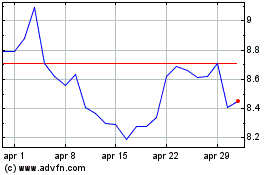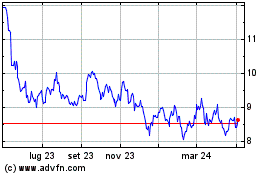Indian Mobile Operators Cut Services in Capital in Bid to Curb Protests -- Update
19 Dicembre 2019 - 12:59PM
Dow Jones News
By Newley Purnell and Krishna Pokharel
NEW DELHI--As protests against a new citizenship law spread
across India, authorities employed a harsh but familiar tactic:
They pulled the plug on the internet--this time targeting parts of
the capital for the first time.
Bharti Airtel Ltd. and Vodafone Idea Ltd., two of India's three
largest carriers by subscribers, told customers Thursday on Twitter
that they were complying with government instructions to suspend
voice, text messaging and mobile internet services in some areas of
New Delhi. The area is home to more than 20 million people.
Representatives of the carriers declined to comment. A
spokeswoman for India's Ministry of Home Affairs couldn't be
reached for comment.
Authorities banned large gatherings in cities across India on
Thursday, including parts of the capital, ahead of planned
nationwide protests by students and civil-society groups demanding
the Citizenship Amendment Act be repealed.
Prime Minister Modi's government last week pushed through the
bill, which created a simplified pathway to citizenship for
immigrants of all the major religions of South Asia, except Islam.
Protests in Muslim-dominated parts of New Delhi have broken out in
recent days.
In India's technology hub of Bangalore, police detained civic
leaders Thursday, including noted historian Ramachandra Guha, who
participated in a banned demonstration against the law.
In the capital, a large crowd of protesters gathered around the
city's iconic Red Fort area, despite a police ban on such
assemblies. Several subway stations around the area were shut down
to make it harder for the protesters to reach the site.
Authorities in Uttar Pradesh, India's most populous state, also
banned large gatherings.
The move is India's latest effort to stifle access to the web,
which is used by about half of the country's 1.3 billion people.
They depend on it for WhatsApp conversations with family and
friends, use it to hail rides, shop online, book taxis, transfer
money and more. But the government appears concerned the internet
will be used for something else: fomenting dissent and organizing
protests.
So far this year India has cut access to the internet 94 times,
according to India's SFLC.in, a group that advocates for digital
freedom. That accounts for 67% of the world's documented shutdowns,
the organization says.
Thursday's shutdown marks the first time the capital has been
targeted, said an SFLC.in spokesman. "It's a first for Delhi," he
said.
Last year India saw 134 internet shutdowns--more than any other
country, according to Access Now, another advocacy group. That was
more than 10 times its neighbor Pakistan, which came in second with
12 shutdowns, and far more than Yemen and Iraq, with seven
each.
Internet services have also been disrupted in recent days in the
Northeastern state of Assam, which has seen protests related to the
legislation. Parts of the state of Jammu and Kashmir have had
internet services suspended since early August, when the government
removed the special autonomous status the only Muslim-majority
state in India had enjoyed.
"Internet shutdowns curtail freedom of expression, cut access to
information, and can inhibit people from assembling and associating
peacefully, online and off," Access Now said in a report. Moreover,
"many victims are unable to reach their families, get accurate
information to stay safe, or reach emergency services," the group
said.
Write to Newley Purnell at newley.purnell@wsj.com and Krishna
Pokharel at krishna.pokharel@wsj.com
(END) Dow Jones Newswires
December 19, 2019 06:44 ET (11:44 GMT)
Copyright (c) 2019 Dow Jones & Company, Inc.
Grafico Azioni Vodafone (NASDAQ:VOD)
Storico
Da Mar 2024 a Apr 2024

Grafico Azioni Vodafone (NASDAQ:VOD)
Storico
Da Apr 2023 a Apr 2024
